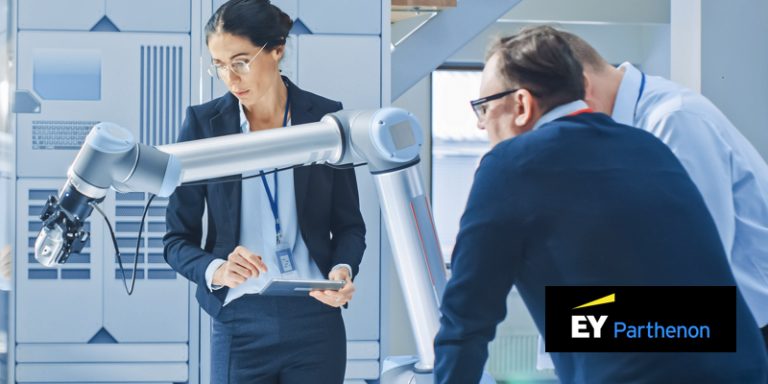
Industry is one of the sectors where digital transformation is accelerating exponentially, manufacturers confirm the need for certified or validated trusted AI solutions. Mandated by the General Secretariat for Investment, EY-Parthenon has conducted an AI market study toevaluate and qualify use cases requiring a trust contribution before being deployed in industrial environments .
To enable institutions to define the lines of the future regulatory framework for trusted AI, EY-Parthenon conducted a market study on the subject in 7 industrial sectors in Europe, North America and Asia-Pacific, allowing to evaluate and qualify the main markets and use cases that require maximum trust input before being deployed in industrial environments.
This survey highlights an AI ecosystem in full structuring, supported at the national level by France IA since 2017 and the Programme d’investissements d’avenir (PIA) through a Grand Défi “securing, making reliable and certifying AI-based systems”, whose major objective is the “industrialisation of artificial intelligence” for critical systems. On November 8, an investment of 2.2 billion euros was dedicated to AI for training and innovation in France.
The European Commission also published its “AI Act” project on 21 April, which aims to make Europe the world’s centre for trustworthy AI. The main common mission with this project is to promote the development of AI throughout the European Union, while addressing the potential risks to the security and fundamental rights of citizens in some of its applications.
Julien Chiaroni, director of the Grand Challenge “Securing, making reliable and certifying AI-based systems”” at the General Secretariat for Investment (SGPI) said:
“Trusted AI is one of the key issues both in terms of economic competitiveness with an estimated market of more than 50 billion (€), but also in terms of sovereignty and responsibility, as the spread of AI is so rapid in all industrial sectors. France has undeniable assets to meet this challenge in a context of future regulation at the European level.”
Key points of the study:
- Globally, only 10 to 15% of companies have successfully industrialized AI-based solutions in their business and 30 to 40% are limited to experimentation.
- A trusted AI market estimated at 52 billion euros in several sectors studied (Automotive, Railway, Aeronautics, Energy & Resources, Banking, Insurance, Pharmaceuticals).
- A growing need among manufacturers for trust solutions paving the way for a market of certification or validation of AI systems.
A heterogeneous and still cautious deployment of AI in industry
If on average manufacturers (all sectors included) invest between 0.4% and 1% of their turnover (led by the Technology, Banking, Health / Life Sciences and Automotive industries) in projects involving Artificial Intelligence, the industry remains cautious (or under-resourced) to integrate AI components in industrial processes, products or services on a larger scale.
- Only 10 to 15% of companies have succeeded in industrializing AI-based solutions;
- 30 to 40% are limited to experiments on limited perimeters or processes.
Several reasons may explain this caution:
- Difficulties in obtaining quality data to train, maintain algorithms and be able to deploy applications at scale;
- Uncertainty on the part of management to capture ROI, which hinders decision making;
- A legal framework that does not address the issue of liability, limiting trust in AI-based systems.
Sectors investing in AI: Automotive, Pharmaceutical and Energy & Networks
The study also focused on the weight of investments related to AI use cases considered critical, requiring a high level of confidence prior to any deployment.
Nine industrial sectors considered as priorities were studied: Aeronautics, Insurance, Automotive, Banking, Electricity and Networks, Railways, Minerals and Metals, Oil and Gas, Pharmaceuticals.
The AI budgets, including personnel costs, are heterogeneous according to the industrial sectors. In the Automotive or Pharmaceutical sectors, the main players in the sector spend or invest between 0.8 and 0.9% of their revenues in AI projects, whereas the coefficient is lower in Insurance or Railways where the percentage is 0.5 to 0.7% of revenues. On the other hand, the Banking sector, a pioneer in the field, stands out with nearly 1% of the revenue of players dedicated to AI.
The AI budget of companies is growing rapidly, estimated at more than €230 billion in 2020 worldwide (excluding internal personnel costs) and growing at +18% per year to reach more than €450 billion in 2024, thanks to the gradual adoption of AI in the industry.
Guéric Jaquet, Partner EY-Parthenon; states:
“The already highly atomized AI ecosystem is therefore continuing to develop and makes the notion of trust central to accompanying these market opportunities. The AI solutions segment (applications, systems and development platforms), representing 85% of the market, is driving growth, accompanied by a need among manufacturers for infrastructure (storage space, servers, computing power) as well as support for deploying and auditing their Artificial Intelligence-based systems. This paves the way for a certification or validation market for AI-based systems that can be trusted.”
Issam Taleb, Partner Director EY-Parthenon, meanwhile, adds:
“The Artificial Intelligence market is progressing at great speed, driven by a growing number of use cases. The provision of trust will act as a catalyst for this trend and will open the doors to a vast addressable market for new generalist and specialist players. The development and fragmentation of the AI ecosystem (between suppliers of technologies, services, platforms, databases, or even computing and storage power), must encourage manufacturers to rethink their market penetration strategies. While these strategies do indeed respond to the challenge of competitiveness, they must also address the issue of digital sovereignty.”
The analysis and qualification of the main AI use cases have thus allowed to divert a trusted AI budget by industry confirming the presence of a significant market in value, estimated at nearly 52 billion euros in France on the 7 sectors studied, especially in mobility with the financial and energy sectors…
Translated from Quel avenir pour l’IA dans l’industrie ? Une enquête de Ey-Parthenon soulève la nécessité de l’IA de confiance









